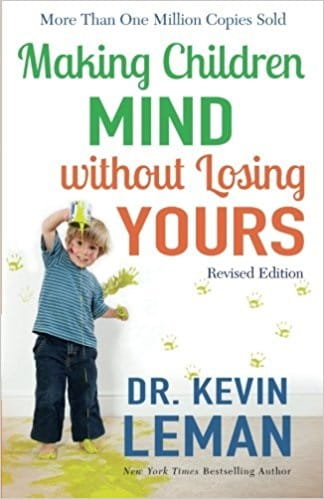3 Things Your Child Can't Live Without

[Editor's note: Dr. Kevin Leman is an internationally known psychologist, radio and television personality, speaker, and educator. He’s a New York Times bestselling and award-winning author of more than 50 books, including "The Birth Order Book" and "Have a New Kid by Friday". Dr. Leman has made thousands of house calls through radio and television programs, such as TODAY, Good Morning America, CBS This Morning, Fox & Friends, The View, and CNN. He lives with his wife, Sande, in Arizona; they have five children and four grandchildren. Be sure to check out Dr. Leman's newly revised best-seller, "Making Children Mind Without Losing Yours".]
Think back to how you felt at your child’s age. What did you worry about? What embarrassed you? When did you feel inferior? How did one social mistake paralyze you? What single comment from your mom or dad turned your terrible day around?
Sooner or later, every child faces a canyon of inferiority—that time when they feel like everybody’s looking at them, when they’re the only one in the whole world with a zit the size of Mount Vesuvius.
At such times—and all throughout their development—what does your child really need?
The ABCs

The ABCs
SLIDE 1 OF 6
Kids don’t need more stuff. They need three basic things. I call them the ABCs:
A = Acceptance
B = Belonging
C = Competence
Here is what you need to know:
Photo Credit: ©Thinkstock
A: Acceptance

A: Acceptance
SLIDE 2 OF 6
Every child needs to know they’re accepted.
Realize who your child is and accept him for who he is. You love him unconditionally—unique personality and all. Many children who act up do so because they feel unacceptable to their own families.
That feeling of minimal importance in the place that matters most to them drives them toward “I’ll show you...” Being accepted for who you are is one of the universal human needs, and your child is oh so human.
Photo Credit: ©Thinkstock/Youngoldman
B: Belonging

B: Belonging
SLIDE 3 OF 6
Every child needs a place to belong.
Does your child identify with your home? Or with another group, such as his peers?
If your child identifies with a place outside your family, there’s a reason for it. Your home doesn’t feel welcoming to him.
Have you gone out of your way to make your home—whether it’s a studio apartment or a single-family home—a place of comfort? A refuge? A place where he wants to bring his friends? A place where it smells like fresh-baked cookies (even if they’re from a Pillsbury tube)? A place where she knows that anyone she brings home will also be welcomed and happily fed?
Or is it a place where, as soon as your kid walks in the door, she has to play the dreaded game of 20 Questions? “Where were you? Why are you home so late? Why the face? What’s wrong with you? What happened today?” Where she also faces criticism for everything she did and didn’t do? “What did you do? Did you flunk your science test again?”
Your child has to belong somewhere. Wouldn’t you rather she be a “homey”? Then make her environment an inviting one.
Photo Credit: ©Thinkstock/UberImages
C: Competence

C: Competence
SLIDE 4 OF 6
Every child needs to know you consider them competent.
Knowing they’re good at something is a boost to anyone’s self-worth. Your kids need to feel that too. But how can a child gain competence in anything unless she’s given the opportunity? The best place to do so is in the home. Even 2- and 3-year-olds naturally want to be competent. Why else would they insist, “Do it by self”?
That’s why it’s disrespectful to a child to do things for her that she could do for herself. Only by carrying out responsibilities can a child become responsible. Then, as she grows in her skills and confidence, her boundaries can expand.
A note about boundaries:
Photo Credit: ©Thinkstock
Boundaries

Boundaries
SLIDE 5 OF 6
In a loving home where reality discipline reigns, the path of exploration can be wide, but it still has boundaries on it. Each individual can follow her own bent but can’t wander all over the place. Those boundaries build security for your child, because she knows there are limits to how far she can go.
Let me compare child rearing to dog training (Pardon the analogy, but there are similarities.):
Photo Credit: ©Thinkstock
Final Thoughts

Final Thoughts
SLIDE 6 OF 6
A dog who’s well trained knows how far he can go. If he’s in your yard, he’ll go right to the borderline, stand there, and look at you, the master. All you have to do is give him “the look,” and the dog won’t step a paw over the line. He knows there will be consequences if he does. He’s been down that route before and doesn’t like the change in your relationship. He wants to please you.
Your child, too, wants to please you. She needs to be secure in your love. If she knows the rules and you treat her as competent, she may still walk to that line. But she’ll consider your relationship too important to step over it.
For more on Dr. Kevin Leman, visit DrLeman.com.

- get kids to listen to parents
- encourage healthy attitudes and two-way communication
- turn off temper tantrums, minimize sibling rivalries, and foil finicky eaters
- put parents back in the driver's seat
- prompt long-lasting, positive behavior and instill values
- rear respectful, well-behaved children who become responsible difference makers in the world
Thought-provoking questions at the end of each chapter and Dr. Leman's real-life examples give readers sure-fire techniques for developing a loving, no-nonsense approach for rearing children. With over a million satisfied customers, parents can't go wrong with this classic, perennial bestseller.
Photo Credit: ©Thinkstock
Originally published May 24, 2019.






